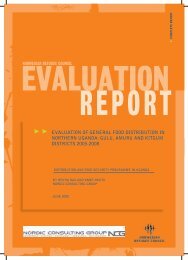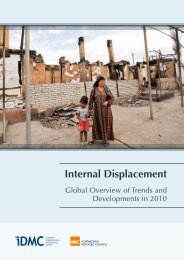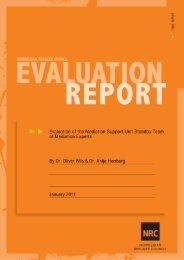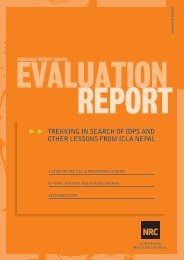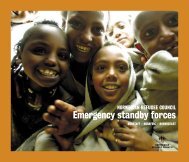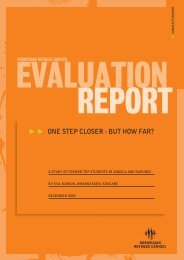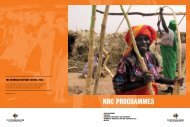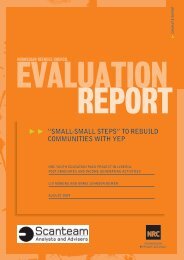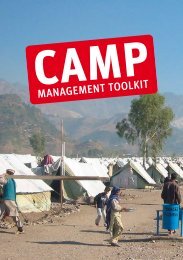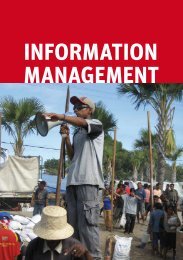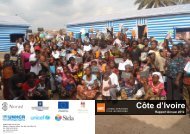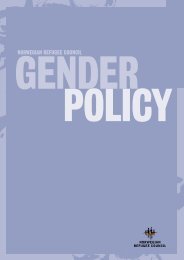Evaluation of NRC Food Security and Livelihoods Projects in Chiredzi and Chipinge Districts of Zimbabwe7. Sustainability / ConnectednessOverall, sustainability of the livelihood programs was high, with around 97% of beneficiaries stating thatthey planned to continue with the livelihood activities initiated by the NRC project after the end of theprogram. The only activity w<strong>here</strong> a small number of beneficiaries said they would not continue was layerpoultry activities initiated under the market linkages program. The reason for not continuing was given asinability to access inputs (birds available on credit) after the end of the project.Will you continue with these activities / projects after the end of the NRC project?Food Security and Livelihood ProgramNo(%)Yes, but at aSmaller ScaleYes, at theSame ScaleYes, at anIncreasing16Number(N)(%) (%) Scale (%)Conservation Agriculture 0 0 1.4 98.6 145Low Input Gardens 0 0 5.6 94.4 142Small Livestock 0 4.5 6.4 89.1 156Market Linkages: Maintain Market Links? 0 4.2 12.5 83.3 96Market Linkages: Other Activities 7.1 4.3 8.6 80.0 70Income Generating Activities /CCT 0 3.2 4.8 92.1 63Total 0.7 2.4 6.1 90.8 674Concerns voiced by beneficiaries with regard to difficulties in continuing with livelihood programs afterthe end of the NRC project included:‣ Some chemicals required (e.g. pesticides) are difficult to obtain / lack of finance to purchasethem (Market Linkages, Conservation Agriculture, LIG)‣ Seed availability - may not be able to afford seeds / access quality seeds (Market Linkages)‣ May be difficult to link with marketers (ARDA, GAS) (Market Linkages)‣ Problems sourcing other inputs, i.e. fertilizer, pesticides, knapsack sprayers, and other tools.(Conservation Agriculture)‣ Conservation agriculture is very labour intensive, and they have problems controlling weeds‣ Problems identifying diseases of goats and poultry and required treatments (Small Livestock)‣ Accessing medicines, especially as income benefits have yet to be realised (Small Livestock)‣ Lack of access to water / goats having to travel far for water (Small Livestock)‣ No longer able to access training on health and care of poultry (Small Livestock)‣ Finding markets for Guinea Fowl if they are to be sold (Small Livestock)‣ Problems transporting products to / from markets – distance and cost – is a major problem formany beneficiaries, especially in remoter Wards such as Ward 15 Chipinge (IGAs)‣ Lack of licences for selling (IGAs)‣ Lack of income for expanding the enterprise / buying inputs (IGAs)‣ Buildings (chicken housing, bakery) not adequate / able to withstand rains (IGAs)‣ Lack of adequate fencing for gardens / pigs destroying neighbours’ gardens (IGAs)‣ Lack of lights for feeding / caring for livestock at night (IGAs)The main concern identified in relation to sustainability relates to the Unconditional Cash Transferprogram. Payments were programmed for a very limited time scale (3 months), but no rationale forchoosing this time period was identified other than duplicating payments under the conditional cashprogram. However, unlike the conditional cash program, the unconditional cash program lacks a definedsustainability component or exit strategy. Beneficiaries felt the funds received were insufficient to enablethem meet their basic needs or to plan ahead. Consequently they consistently <strong>report</strong>ed experiencingdifficulty in maintaining food consumption when the payments ended. In many cases, children enrolledin school when the payments were made were withdrawn from school again when the payments ended.NRC’s Food Security and Livelihoods program is closely linked to interventions occurring under its otherCore Competencies, particularly Community Based Planning. The Community Based Planning (CBP)program has been highly successful in identifying needs, achieving community ownership of Ward plans,
Evaluation of NRC Food Security and Livelihoods Projects in Chiredzi and Chipinge Districts of Zimbabweand for fostering cooperation with local authorities (who formally adopted the plans). It is a valuableprocess and should continue to be used in future projects. However CBP and livelihoods elements arecurrently disjointed, with each having its own action plan and different coordinators. This createsdifficulties in planning and coordinating activities, and in particular FSL activities become delayed waitingfor completion of CBP processes. As programs currently have a one year time span, delays cancompromise staff’s ability to fulfil project outcomes in a timely manner. NRC should thus The strongsynergies between these programs could thus be improved and strengthened through the adoption of aSingle Work Plan approach.The NRC programs have closely involved local Agritex staff to promote continued support forbeneficiaries after the end of the NRC project. In addition, Trainings of Trainers (TOTs) involving localgovernment stakeholders have been undertaken to increase local capacity to maintain gains made bythe programs.Key RecommendationsConsider inclusion of an exit / sustainability strategy in future unconditional cash transfers.Consider adopting a single work plan approach, covering both Food Security and Livelihoodsprograms and other NRC Core Competences, particularly Community Based Planning (CBP).The strong synergies between these Competences could be strengthened through a single workplan approach.More frequent field monitoring visits involving District level stakeholders would help reinforcecapacity building / participation of local stakeholders in continuing support to beneficiaries.Better coordination with other NGOs providing TOTs to the same stakeholders could beachieved by increased sharing of information, to avoid duplication of trainings for the sametarget stakeholder groups. This could be achieved by resurrecting the lapsed NGO coordinatinggroup, or by including information on forthcoming trainings in bulleting / documents shared withother NGOs and training providers.17




